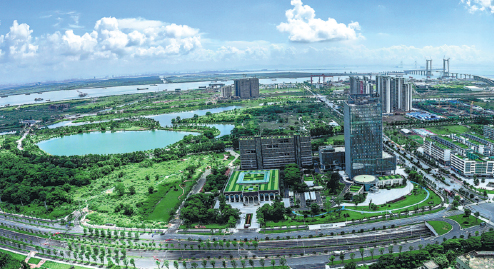Zhongshan invests to bolster future of economy
A major city at the heart of the Pearl River Delta region, Zhongshan is at the forefront of economic development in South China's Guangdong province.
"With the Shenzhen-Zhongshan Bridge due to open next year across the Pearl River, the city has ushered in a new round of major development opportunities," Guo Wenhai, the city's Party secretary, said at the opening ceremony of the 2023 Zhongshan Global Investment Promotion Conferences held on March 30.
During the event, more than 40 projects were signed with a total investment of nearly 90 billion yuan ($13.13 billion).
The conferences also introduced 23 high-quality projects seeking investment worldwide. They cover such sectors as smart home appliances, new-generation information technology, high-end equipment manufacturing and new energy.
The Shenzhen-Zhongshan link is expected to cut the commuting time between the two cities from two hours to about 30 minutes. Also, the Nansha-Zhuhai (Zhongshan) Intercity Railway is now under construction, which will shorten the travel time between the downtown areas of Zhongshan and Guangzhou to 45 minutes in the future.

Zhongshan is at the forefront of economic development in Guangdong province. CHINA DAILY
"The two projects will make the integrated development between Zhongshan and Shenzhen, as well as Zhongshan and Guangzhou, a reality," Guo said. "To invest in Zhongshan is equivalent to investing in Shenzhen and Guangzhou," he added.
Zhongshan will build a reform and innovation experimental area to promote the integrated and interactive development of the east and west banks of the Pearl River Estuary. This means the city will be given strong policy support in various aspects, according to the local government.
Zhongshan takes the real economy as its foundation and highlights the manufacturing industry.
It has planned 10 themed industrial parks covering a total area of 27,200 hectares.
Also, the city has been positively promoting the transformation and upgrading of inefficient industrial parks in villages and towns. Through the initiative, Zhongshan will vacate more than 13,333 hectares of land for industrial use.
"We have invested 5 billion yuan to promote the digital and intelligent transformation and upgrading of traditional manufacturing, and to boost the development of 10 industries including new energy, biomedicine, health and new-generation IT to help companies better explore the international market," Guo said.
According to Zhongshan Mayor Xiao Zhanxin, the city has created a series of incentive policies for companies ranging from startups to listed ones. For example, headquarters of Fortune Global 500 companies and China's top 500 enterprises can receive a maximum reward of 100 million yuan each. Leading companies that achieve breakthroughs in operating revenue will each be rewarded up to 50 million yuan.
Moreover, Xiao said the city boasts a large number of financial institutions and has formed a multilevel financial service system to meet the financial needs of enterprises. It provides diversified financing like using technologies and intellectual property as loan collateral.
Zhongshan has established a government fund with a total management scale of 11 billion yuan, to mainly support the development of biomedicine, new energy and other strategic industries.
To create a market-oriented and law-based business environment is always the first priority of the city government's work, it said. Also, Zhongshan aims to become one of the cities in the Guangdong-Hong Kong-Macao Greater Bay Area with the fastest approval speed and the highest service efficiency.
H. Fai Poon, CEO and co-founder of QuaCell Biotechnology, said the company's growth is inseparable from the help and support it received from the Zhongshan government.
"The first thing the city government did was to give us a laboratory, so that we could complete product research and build our first production line to good manufacturing practices, or GMP standards," said the CEO. Currently, the company has become a leading manufacturer in the field of cell culture in China.
"I am glad that I chose Zhongshan, a city with excellent platforms. I also hope that more young elites from Hong Kong and Macao come here to learn more about Zhongshan and its policies," he added. In recent years, the city has issued many preferential policies pertaining to taxes, industrial development and talents, which all help enterprises develop smoothly.
Kaneo Saito, general manager of Minebea Access Solutions (Guangdong), said the company, which was founded in 1996 in Zhongshan, has seen rapid development over the past 27 years with the help of local governments at all levels.
From a small company with only 30 employees, it has grown into a large enterprise with more than 1,400 employees and an annual output value of 1.5 billion yuan.
"The Zhongshan government attaches great importance to the real economy and issues many policies to support the development of enterprises, encourage innovation and digital upgrading, and help attract talent. The demands of enterprises can also be quickly dealt with. All these facts have attracted Minebea to continuously expand investment and production here," said Kaneo.



 Print
Print Mail
Mail

